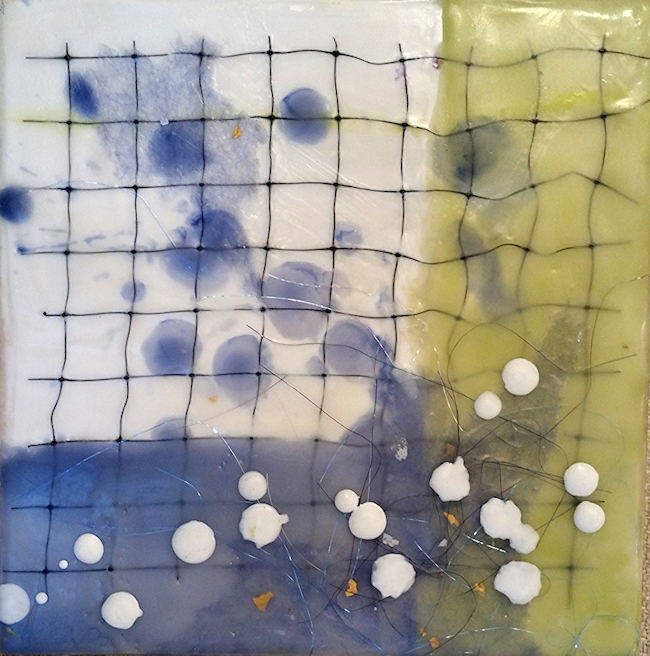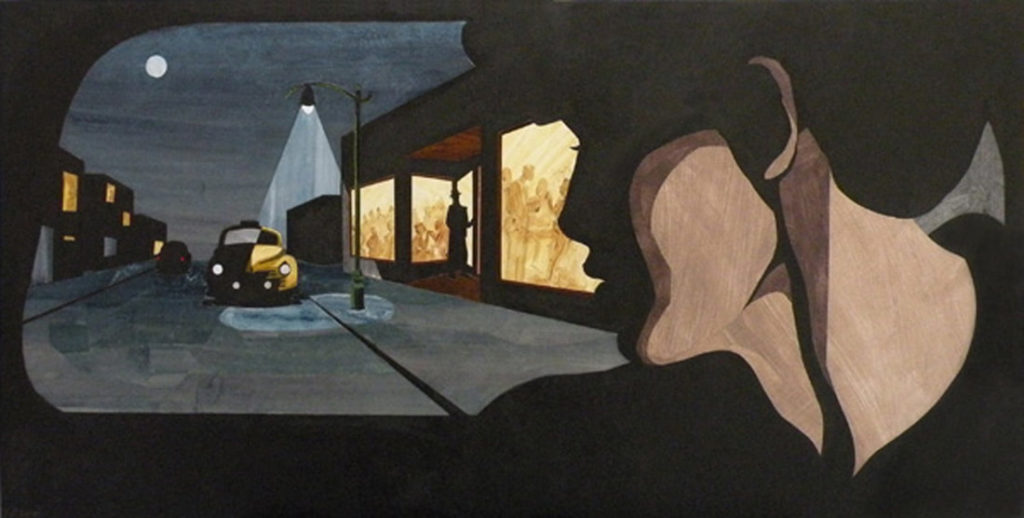Sales from your art gallery are not what you expected or need them to be.
They sold a lot of your work at one point, but sales have dropped off significantly in the past couple of years—especially during the pandemic.
So what now? Do you ask for your work to be returned?

Not quite! Before you take such drastic measures, do the hard, but professional thing. Talk.
Opening a dialogue is your first course of action, but I don’t want to get ahead of myself. First things first.
Assess Your Relationship with the Gallery
The conversation you have with your gallerist about slow sales depends on the answers to a number of questions.
- How long have they have represented you?
- How much work have they sold for you in the past?
- What are the terms of your agreement with the gallery?
- What is the nature of your past relationship?
- What is the current state of the gallery’s business? How has it been affected by the pandemic?
- What is the demand for your work outside of their venue?
2 Options for Opening a Conversation with Your Gallerist
Based on how you respond to the questions above, consider 2 options for opening a conversation about slow sales from the art gallery.
1. Ask Why.
“You mentioned that people have been saying nice things about my art, but sales have been slim. Do you have any idea why?”

You can actually do this: Come right out and ask!
This is an open-ended question. The response might be that they have no idea, in which case you should reconsider working with that gallery. They should know the market and be analyzing the factors that contribute to sales.
On the other hand, you might discover valuable clues such as:
- The work is too small or too large for what they’re selling right now. Ask if they’d like different sizes.
- Your price point is out of their sweet spot, which has changed since you joined their stable. Ask if they’d like to experiment with different work from your studio.
- Your palette is too green or too pink. Hey, this could be a real possibility. Gallerists know trends.
- Someone close to your gallerist is dealing with an extended illness and they have had to spend time away from their desk. In other words, they haven’t had time or energy to promote it. Boy, though, it would have been good if they had told you this.
You might also learn that they aren’t selling a single thing. It’s not just your work that isn’t selling.
Or they are spending a lot of time promoting five new artists they added to their stable, which makes you feel like your work has been banished to the back room.
Knowing these answers will give you valuable insights into what your next step should be.

2. Offer to help.
“How can I help you sell more of my art?”
It’s natural for you to want to ask Why aren’t you selling more of my art? But this doesn’t sound very cooperative, and puts your gallerist on the defensive. (A better way to ask this is under #1 above.)
Remember that you are in a partnership with the gallery. When they do well, you do well. Anything you can do to help increase sales benefits you, too.
By asking this question, you are reaffirming your role as a partner. And you’re confirming that you are professional, cooperative, and helpful.
Another way to put this might be …
“Do you need anything from me that would help you sell more of my art?
Again, this confirms your role as a partner.

You want to help. You might also offer specific actions that could move the work.
Would you like different work? Would you like for me to exchange what you have for new (or larger/smaller, bluer, less expensive) pieces?
Would it help if I updated my artist statement or provided you with additional stories about the work?
What if I made a video for your website?
Would you like to schedule an artist talk? I’d be happy to discuss my work at your next VIP reception.
Only you can decide the best course of action for your relationship with your gallery. But it’s always better to open the conversation than to stew in your unhappiness.
Regardless of the outcome, you will be admired for your professionalism and feel good that you took charge of your career.
This post was originally published on March 23, 2017 and has been updated with comments intact.



27 thoughts on “How To Discuss Slow Sales with Your Art Gallery”
Thanks for featuring art on your blogs!
I am especially happy to see Bonnie Mason’s still life.
She is a wonderful artist and friend.
Keep up the good work that you do.
You’re welcome. We’re so happy that artists are so generous with sharing.
I wish I had the opportunity to partner with a “Non Vanity” art gallery, to even get to the point of asking why is my stuff not selling. Someone once told me that, “…you don’t go to them (the galleries), they will find you…”.
Daniel: Wow. So you’re just supposed to sit around and wait for them to come to you? That doesn’t sound like a good strategy.
I agree with Alyson. You have to find ways to get your name and your work in front of the galleries. They aren’t looking for artists.
I think it’s a good idea to trade out art with new fresh pieces and I have found owners and managers very receptive to this. In fact, I just did it this weekend. A fresh look with new pieces of current work really helps.
Sylvia: This is easier to do when the gallery is local. Do you do it, too, when you have to ship new pieces?
Thanks, Alyson. Great article. Having been associated with galleries both large and small across the country for over 20 years, I can assure you that every one of the above points has entered into my career. And one’s first reaction is to get mad or hurt at a gallery. But I have found out that in some cases it can be a factor unseen by the artist that is affecting sales – a new hip gallery moved into the neighborhood and is drawing attention, the owners are getting tired of being gallery owners, or, yes, your work just doesn’t fit their new direction. I have two great galleries now, one that I have been with for over 7 years, one for just over 1 year. One sells like crazy, one sells slower but steady. I think the main thing for any artist is not to wait until it’s too late to talk. When you see sales slowing down, get on the phone. As you state in the article, they are your partner and if sales are down, one of you is going to need to get it going again. Talking will work it out. Quietly stewing over it, won’t.
Thank you for sharing your experience, Brad. Very helpful.
Thanks for the great article Alyson. It gets me thinking about sales from our local Madison Artists Guild gallery here in Madison, GA. I will be heading to a board meeting this afternoon and will bring this up, as well as your career programs with them. Pete
Hope it helps, Peter.
Thank you for this important, helpful article. :-))
Absolutely spot on, especially at this time of year when business seems slow. I had a similar experience and was getting steamed up. Until I asked the gallery whether I could help out. They came straight back and confessed to having staff changes. Plus putting in new marketing strategies for their gallery. We as artists sometimes forget that a gallery is a distinct business with its own problems. I appreciated their quick and honest response. Always a good sign for artists. But I still market my own work where ethically possible. Also important.
Malcolm: Really appreciate your sharing your experience here.
Alyson I would agree with what you have said completely. My experience has been more along the lines of working with galleries that are incapable of closing a sale. there are many different types of galleries and not all of them are very adept at selling art. I have one old school gallery that sells a lot of my work. He doesn’t make any money unless he sells art. he doesn’t ever discount the art or ask for lower priced work and we seemed to have found that sweet spot on pricing. after submitting my work to over 200 galleries in the southeast I was accepted by about 5. 4 of which I have shown work for about a year which was the length of the contract. I found that the 4 that failed to sell my work had other sources of income like workshops classes and framing (and also wealthy husbands) to pay their bills. I realized that these galleries loved to show my work as it dressed up their gallery in a decorative sense and they were very particular on how and where every piece was hung and they didn’t really want anything to move as in a sale or empty place on the wall to fill. My good gallery just hangs something up in the empty sales space and moves on that is a big difference in salesmenship. I also have found that a gallerist has to be totally in Love with your work for them to sell it. If they are just lukewarm about your work they won’t be selling it. Non Profits and Vanity Galleries are the worst. I ended the agreements with the non selling galleries with the realization that it wasn’t benefiting either me or the gallery to continue. it was tying up their wall space as well as my inventory. The good galleries are harder and harder to find as well as nearly impossible to gain representation
Kevin: Super helpful. The gallerist needs to be hungry. And I also agree that they need to be in love with your work. I can’t imagine any other scenario but thanks for the warning.
Great article, Alyson. It’s almost always up to the artist to keep the dialog going with a gallery. They are busy, but I find they are almost always happy to have me ask the tough question straight out. Offering to bring in new work is a big help, as are honest questions about pricing, size and color.
Thank you for sharing this, Karine. I’m sure they appreciate your professionalism.
Excellent blog post. As a gallery owner and artist, I appreciate all of the points that you made. I will share this with my circle of represented artists and artist friends.
This post was a good one for me to read today. I have been having a lot of slow/non-selling galleries over the past couple of years. I even removed my work from one of them.
I have asked those or similar questions of the dealers over the years but not so much lately.
This is a good push for me to get back in communication a little more again.
Thanks, Alyson.
Cheryl
I work with several galleries in different parts of the country, and it is fascinating to see how their fortunes – and the sales of my work – ebb and flow over time for a lot of different reasons. I have found, in nearly every case, that if sales have declined or are not meeting expectations, the gallery owners and staff are more than willing to brainstorm with me about ideas to bring in more buyers or get the right work in front of the current buyers. Although there are certainly situations where asking for my work to be returned might be the right answer, it is good to keep in mind that improving a current gallery situation is probably going to take a lot less time and effort than finding another gallery. Poor communications or bad business practices are much more likely to cause me to ask for my work to be returned than a temporary slowdown in sales at a gallery where I have a good relationship.
This is a great concept , and very interesting ideas as to how to approach the Gallery because we do wonder why our art doesn’t always move. So thanks Alison for good ideas.
I will add my Website but still in the process of getting my pictures up .Having problems.
Josie Gabe
Hi Alyson , Can I send you a Picture of my art? also how would you like me to go about it.
Josie Gabe
Excellent, excellent article and wonderful things to think about via the added comments. Again, it all involves honest communication and a willingness to work together not letting pride get in the way. Will read and re-read.
Alyson, you are the brightest spot in my art day — you are lovely to look at, have expert ideas and are so generous with your knowledge. I have sold my art on Etsy for several years and am designing a website. You are stretching the vision I have of myself. Many thanks. Keep up the life-changing posts and thank you for writing “I’d rather be in the studio”.
Cheers,
Susan Givens
Good evening….
I offer you my sincere greetings and great honor to write to you and communicate with you
I am a plastic artist and sculptor. I have 25 years of experience. I have held many art exhibitions, obtained many honorable certificates and obtained a certificate of qualification (drawing and decoration). I have learned how to help people through art, but unfortunately art in third world countries is not very popular.
And the artist remains struggling to connect his art to the people and the world
To help others with my art in order to see my works of art as the light of this I am always looking for help … It is my great goal to hold exhibitions around the world because art is the best communication language among individuals,
Hi Alyson, I like your thought about art very much.